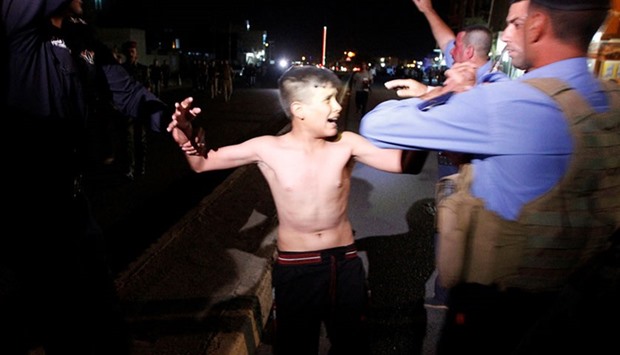The foiled attack late Sunday was one of a series of security incidents in Kirkuk and came a day after a child suicide bomber killed more than 50 people in Turkey.
"Police forces managed to stop a bomber who was wearing a suicide belt. He was born in 2001," Kirkuk police chief Brigadier General Khattab Omar Aref told reporters.
He said the boy likely intended to blow himself up at a Shiite place of worship in Kirkuk, an ethnically and religiously mixed city that lies 240 kilometres (150 miles) north of Baghdad.
Nighttime TV footage showed a boy holding his hands in the air as security forces removed the explosives belt from around his waist.
The thwarted attack was one of four separate security incidents in Kirkuk over a few hours, including one in which a policeman shot a suicide bomber who tried to enter a Shiite prayer hall.
"The police forces have managed to foil a terrorist operation that could have caused victims and led to a catastrophe for the province," Kirkuk Governor Najmeddin Karim told AFP.
The security situation has been tense lately in Kirkuk, which is under Kurdish security control but is also home to Turkmens, as well as Sunni and Shiite Arabs.
Aref said the attackers involved in the latest string of incidents entered Kirkuk recently and came from Mosul, the last remaining major bastion of the Islamic State group.
Iraqi forces are currently conducting shaping operations on several fronts to tighten the noose on Mosul -- Iraq's second city -- and set the stage for an offensive.
The IS group, the most extreme organisation in modern jihad, has routinely used children to perpetrate crimes.
It provides young boys in its self-proclaimed caliphate military training from a very young age.
According to Turkish President Recep Tayyip Erdogan, the bomber who killed at least 54 people at a Kurdish wedding in the city of Gaziantep was aged 12 to 14.
Military officials, including from the US-led coalition fighting IS, have said the group was increasingly resorting to under-age fighters because a string of defeats and setbacks was stretching its ranks thinner than ever.

Iraqi security forces detain a boy after removing a suicide vest from him in Kirkuk, Iraq, August 21, 2016. REUTERS
Iraqi security forces apprehended a teenager wearing a suicide belt before he was able to detonate it in the city of Kirkuk, security officials said on Monday.
